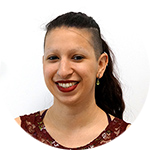Meet RC’s first Fellows
This January we launched an experiment: we offered Fellowships of up to $10,000 to women, trans, and non-binary people who planned to work on open-source projects or research at RC.
The quantity and quality of the applications we received was incredibly impressive. We were able to fund Fellowships for six folks: three for one-week mini retreats and three for full 12-week batches.
How Fellowships improved RC
Our forecasted gender balance for the beginning of 2019 was concerning, and we ran this experiment in December to reach and support more women, trans, and non-binary applicants to RC. The results have been very encouraging: two of our batches so far this year have had at least 50% women, trans, and non-binary people! Across all four of our batches that have started since January, nearly half (46%) of new Recursers have been women, trans, and non-binary. In addition to the six Fellows we were able to fund, many more people heard about RC for the first time or were encouraged to apply after seeing our announcement. It has been interesting to see what a more gender-balanced Recurse Center is like day to day.
Like the rest of RC, the Recursers who joined our community after hearing about Fellowships have a wide range of interests, backgrounds, and expertise. RC feels more like itself when there are more programmers who are women, trans, and non-binary here: that is, a more creative, curious, and rigorous place to program.
Anecdotally, the past three months at RC have also felt more interdisciplinary than ever. Recursers have worked on programming projects related to music, art, games, design, language, philosophy, history, biology, activism, civic data and urban planning, and more. There have been weekly study groups formed to discuss the political ethics of tech, as well as the creative applications of deep learning. It is thrilling to be in a space filled with smart, curious people who are experts in all of those domains.
Many of our Fellows who do research noted that they chose to come to RC to be in a diverse environment with an interdisciplinary focus—to get out of their bubbles and be around programmers from different domains. At RC they found an infusion of creative energy, the serendipity of new connections made, and the opportunity to learn from experts in a completely different field, all of which fed back into their own research.
Meet the Fellows
The Fellows also did some incredible work at RC, from building new genome-sorting algorithms to recreating vintage computer art to building a blockchain for prayer. Read more about each of them below!


Having somewhere to ask the questions you’re nervous about, and receive thorough, supportive, and informative answers, is awesome. From the basics of C++ to the niche problems I’ve encountered there’s always someone willing to talk through it or pitch in. Even from afar, it’s easy to keep in touch and ask questions (programming or otherwise) within the community forums. Everyone on the forums has been to RC, so our culture is ingrained there too.

I had so many conversations with thoughtful and excited engineers. RC for me is always a reminder of how great the tech community could be if everyone was friendly and passionate about programming.

I have been a part of a bunch of different art/tech/business communities. The level of curiosity, open mindedness and congeniality is on a different level at RC. The people, individually, are fascinating and since everyone is technical, many conversations from yoga to hip hop to brewing beer are filtered back through the lens of computers and programming… and maybe even turned into a technical project.
I would recommend RC to anyone who loves coding, is interested in being creatively diverted, and wants to be introduced to new technical challenges. To paraphrase Alan Watts — life not a journey but a musical thing and the goal is to dance while the music plays. RC is a ton of fun and makes for good choreography.

RC achieves something very unique through the mindset it fosters. Learning occurs through osmosis, because the type of crowd that RC attracts is comprised of people who are actively excited, willing to share, and keen to learn.

It’s great to work and explore a project while surrounded by other people whose top-level goal is to learn. Even though it was my first time at RC and I only spent a week there, I still feel like I’m part of the community, and not just a visitor. I think part of that is the magic of RC’s community.
In the next few weeks we’ll be writing more about how we’ve improved RC’s gender balance over the years, and how it affects our community and the retreat.
If this type of community and work appeals to you, apply today to spend one, six, or 12 weeks at the Recurse Center! As a reminder, RC is free for everyone, and we offer need-based living expense grants for women, trans people, and people from racial and ethnic groups traditionally underrepresented in programming.
